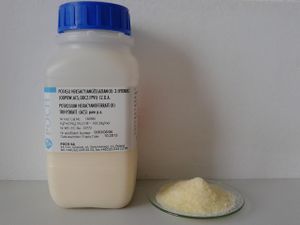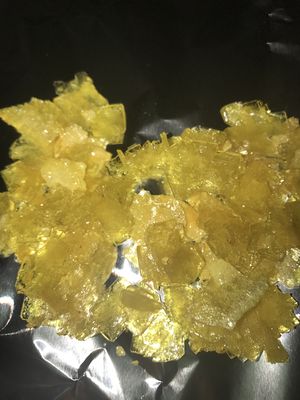Potassium ferrocyanide
 Potassium ferrocyanide sample
| |
 K4Fe(CN)6•3H2O crystals, grown by following ChemPlayer's method of converting K3Fe(CN)6 to the ferrocyanide salt
| |
| Names | |
|---|---|
| IUPAC name
Potassium hexacyanidoferrate(II)
| |
| Other names
Ferrate hexacyano tetrapotassium trihydrate
Potassium hexacyanoferrate (II) trihydrate Tetrapotassium ferrocyanide trihydrate Yellow prussiate of potash | |
| Properties | |
| K4[Fe(CN)6] | |
| Molar mass | 368.35 g/mol (anhydrous) 422.388 g/mol (trihydrate) |
| Appearance | Light yellow solid |
| Density | 1.85 g/cm3 (trihydrate) |
| Melting point | 70 °C (158 °F; 343 K) (decomposes) |
| Boiling point | Decomposes |
| trihydrate 28.9 g/100 ml (20 °C) | |
| Solubility | Insoluble in diethyl ether, ethanol, toluene |
| Hazards | |
| Safety data sheet | Sigma-Aldrich |
| Flash point | Non-flammable |
| Lethal dose or concentration (LD, LC): | |
| LD50 (Median dose)
|
6400 mg/kg (oral, rat) |
| Related compounds | |
| Related compounds
|
Prussian blue Potassium ferricyanide |
| Except where otherwise noted, data are given for materials in their standard state (at 25 °C [77 °F], 100 kPa). | |
| Infobox references | |
Potassium ferrocyanide or potassium hexacyanidoferrate(II) is is the potassium salt of the ferrocyanide coordination complex. It's generally available as trihydrate, K4[Fe(CN)6]·3 H2O.
Contents
Properties
Chemical
Pyrolysis of potassium ferrocyanide will yield potassium cyanide:
- K4[Fe(CN)6] → 4 KCN + FeC2 + N2
Physical
Potassium ferrocyanide is a lemon yellow solid, soluble in water, but less so in organic solvents.
Availability
Potassium ferrocyanide can be purchased online.
Preparation
Can be prepared by heating a nitrogen source, such as potassium nitrate, with iron and carbon.
Projects
- Make potassium ferricyanide
- Anti-caking agent
- Make Prussian blue
- Grow large yellow crystals
Handling
Safety
Potassium ferrocyanide is irritant and should he handled with care.
While it contains cyanide groups, potassium ferrocyanide cannot be broken down to hydrogen cyanide in the organism, making it nontoxic.
Storage
In closed bottles, away from strong acidic vapors.
Disposal
No special disposal is required. Can be dumped in trash.